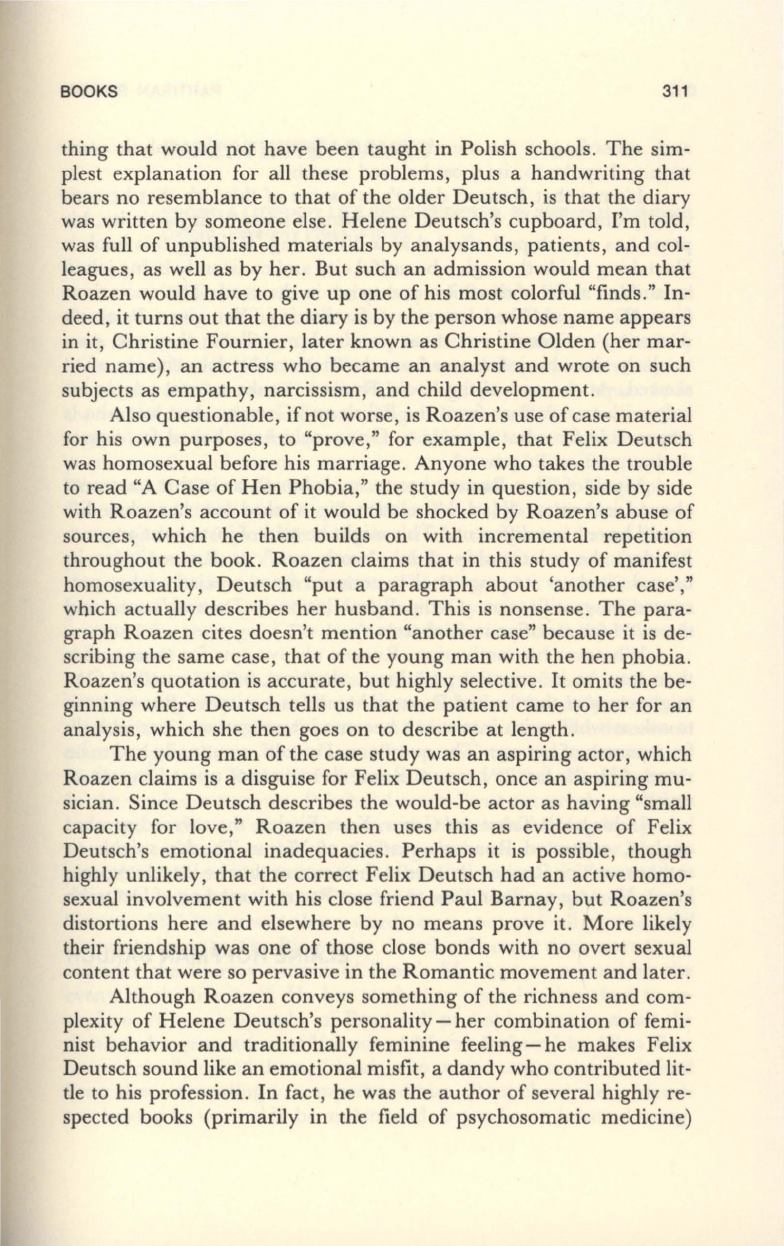
BOOKS
311
thing that would not have been taught in Polish schools. The sim–
plest explanation for all these problems, plus a handwriting that
bears no resemblance to that of the older Deutsch, is that the diary
was written by someone else. Helene Deutsch's cupboard, I'm told,
was full of unpublished materials by analysands, patients, and col–
leagues, as well as by her. But such an admission would mean that
Roazen would have to give up one of his most colorful "finds." In–
deed, it turns out that the diary is by the person whose name appears
in it, Christine Fournier, later known as Christine Olden (her mar–
ried name), an actress who became an analyst and wrote on such
subjects as empathy, narcissism, and child development.
Also questionable, if not worse, is Roazen's use of case material
for his own purposes, to "prove," for example, that Felix Deutsch
was homosexual before his marriage. Anyone who takes the trouble
to read "A Case of Hen Phobia," the study in question, side by side
with Roazen's account of it would be shocked by Roazen's abuse of
sources, which he then builds on with incremental repetition
throughout the book. Roazen claims that in this study of manifest
homosexuality, Deutsch "put a paragraph about 'another case',"
which actually describes her husband. This is nonsense. The para–
graph Roazen cites doesn't mention "another case" because it is de–
scribing the same case, that of the young man with the hen phobia.
Roazen's quotation is accurate, but highly selective. It omits the be–
ginning where Deutsch tells us that the patient came to her for an
analysis, which she then goes on to describe at length.
The young man of the case study was an aspiring actor, which
Roazen claims is a disguise for Felix Deutsch, once an aspiring mu–
sician. Since Deutsch describes the would-be actor as having "small
capacity for love," Roazen then uses this as evidence of Felix
Deutsch's emotional inadequacies . Perhaps it is possible, though
highly unlikely, that the correct Felix Deutsch had an active homo–
sexual involvement with his close friend Paul Barnay, but Roazen's
distortions here and elsewhere by no means prove it. More likely
their friendship was one of those close bonds with no overt sexual
content that were so pervasive in the Romantic movement and later.
Although Roazen conveys something of the richness and com–
plexity of Helene Deutsch's personality - her combination of femi–
nist behavior and traditionally feminine feeling- he makes Felix
Deutsch sound like an emotional misfit, a dandy who contributed lit–
tle to his profession . In fact, he was the author of several highly re–
spected books (primarily in the field of psychosomatic medicine)


